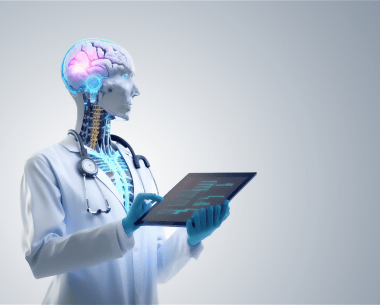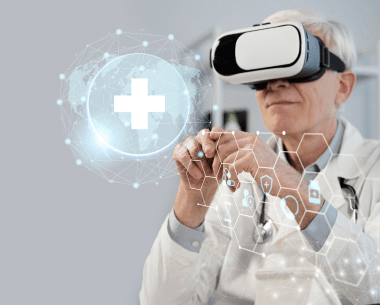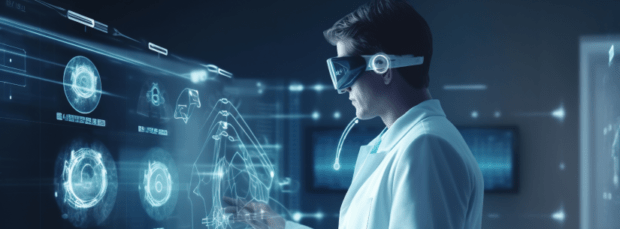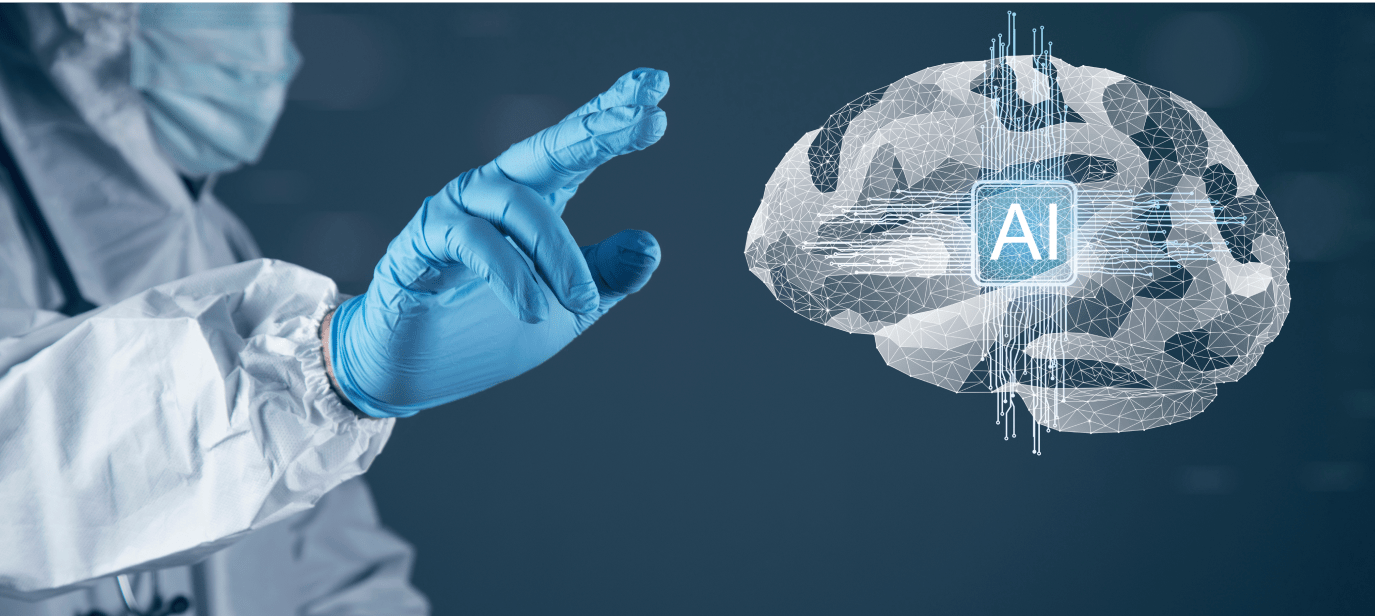The development of technology in many fields, including healthcare, has been fueled by artificial intelligence (AI). With its enhanced diagnostic capabilities, individualized treatment choices, and simplified operations, this cutting-edge technology has the potential to completely change the way healthcare is provided. To guarantee a responsible and ethical integration of AI into healthcare systems, there are legitimate concerns and critiques that go along with these encouraging achievements.
For medical professionals, tech businesses, legislators, and patients alike, it is crucial to understand the prospects and possible problems connected with AI in healthcare. Fostering educated discussions on the advantages, difficulties, and ethical ramifications of AI-driven medicine is essential as we stand on the threshold of a new era in healthcare. This article seeks to give a thorough study of AI’s position in healthcare, including both the numerous potential and challenges it provides. Together, we can strive toward a day where AI-driven healthcare is not just effective and efficient for everyone, but also inclusive and fair.
Healthcare applications of AI throughout history
The first mention of intelligent machines occurred in the 1950s, marking the beginning of AI. AI didn’t, however, start to enter the medical field until the latter half of the 20th century. Early uses of artificial intelligence in medicine centered on decision support systems, such as MYCIN, an expert system created in the 1970s to aid in the diagnosis of infectious illnesses. AI is now able to play a bigger role in healthcare because to improvements in processing power, machine learning methods, and data accessibility throughout time.
AI advancements for the healthcare industry.
Expert Systems in the 1970s: MYCIN was one of the earliest AI applications in healthcare, as was previously reported. It employed rule-based methods to help doctors diagnose and suggest treatments for infectious illnesses.
The 1990s witnessed the creation of artificial neural networks, which allowed AI to learn from enormous datasets, improving diagnostic skills, and setting the foundation for future AI applications.
Deep learning, a kind of machine learning that enables AI to understand intricate patterns and make more accurate predictions, saw a boom in popularity in the 2000s. Because of this, there have been tremendous improvements in medical imaging, including the creation of algorithms that can precisely identify malignant cells in mammograms.
2010s – Customized Medicine: With the development of genomics and the growing accessibility of genetic data, AI started to play a role in personalized medicine, allowing for the creation of customized medicines based on a person’s genetic profile.
2020s – AI Integration: At the present time, there is an increasing amount of AI integration into several facets of healthcare, from diagnostics to virtual health assistants and drug development.
AI in healthcare: Current Situation
Today, artificial intelligence (AI) is revolutionizing healthcare in a variety of ways, from diagnosis and treatment to operational effectiveness and research. Although entrepreneurs are creating creative apps to solve certain issues in the sector, major tech corporations like IBM, Google, and Apple have made significant investments in AI-driven healthcare solutions. Healthcare providers are rapidly using AI-powered solutions to enhance patient care and expedite processes, such as computer vision algorithms for medical imaging and natural language processing for electronic health records.
Nonetheless, despite the enormous progress achieved thus far, the healthcare sector is still just beginning to fully realize the promise of AI. For AI to play a really crucial role in the delivery of healthcare, issues including data privacy, bias, and regulatory concerns must be resolved. The future of healthcare promises to be even more revolutionary and significant as we push AI technology forward and overcome these obstacles.
Opportunities of AI in Healthcare
Diagnostic Support
AI-powered algorithms have shown to be very proficient in analyzing medical pictures like X-rays, CT scans, and MRIs. These algorithms have increased diagnostic skills for a variety of ailments, including cancer, cardiovascular diseases, and neurological problems. They can discover patterns and abnormalities more precisely and rapidly than human specialists.
Individualized Medicine
Treatments may now be customized depending on a patient’s genetic makeup thanks to AI, which can now process and evaluate genetic data. AI may assist in identifying the most successful medicines by comprehending the distinct genetic composition of each patient, eliminating the need for trial-and-error methods and increasing patient results.
Online medical assistants
Chatbots for patient assistance and triage: AI-powered chatbots can provide patients immediate access to medical information, help them identify their symptoms, and advise them on when to seek expert help. This might lessen the strain on medical staff and increase patient satisfaction.
Drug Research and Development
Accelerated drug research with AI algorithms: By examining intricate chemical structures and modeling drug interactions, AI may drastically cut down on the time and expense involved in drug discovery. This makes it possible for researchers to find interesting drug candidates more quickly, which eventually speeds up the creation of new therapies.
Operating Effectiveness
Automating time-consuming administrative chores like appointment scheduling, invoicing, and insurance claim processing is possible with AI. Healthcare personnel may now concentrate on giving patients care and enhancing overall effectiveness because of this.


Criticisms and Challenges of AI in Healthcare
Data Security and Privacy
Data breaches and abuse risks exist because AI depends on a huge quantity of data to generate reliable predictions and suggestions. The risk of data breaches and abuse is raised by this dependence on data, however. Illegal access to sensitive patient data may have major repercussions for the patients who are impacted as well as the healthcare organizations in charge of maintaining patient data security. Data ownership ethical issues: The utilization of patient data for AI-driven healthcare solutions brings up significant issues with data ownership and permission. Patients must be given the option to opt out if they so desire and must be informed about how their data is being used. Maintaining public confidence in AI-driven healthcare requires ensuring openness and moral data management.
Bias and Unfairness
AI systems learn from existing data, which may include prejudices stemming from historical and social imbalances. This has the potential to perpetuate current biases. If these biases are not addressed, AI may continue to exhibit them, resulting in incorrect diagnoses or unfair treatment of patients from various backgrounds. Making sure everyone has equal access to AI-driven healthcare: All people should be able to take advantage of AI’s advantages in healthcare, regardless of their socioeconomic situation or location. To guarantee that AI-driven healthcare solutions are inclusive and accessible to people who need them most, policymakers, healthcare providers, and tech firms, must work together to devise policies.
Regulatory and Legal Issues
Responsibility for medical mishaps caused by AI: Questions concerning responsibility and accountability in situations of medical blunders will unavoidably come up when AI is more thoroughly incorporated into the healthcare industry. Deciding who is accountable in these situations—the AI developers, healthcare practitioners, or any parties involved—is a complicated matter that calls for careful thought and updated legal frameworks. Navigating a regulatory environment that is always changing: As AI-driven healthcare solutions develop, regulatory bodies must change to preserve patient safety and the general public’s interests. This entails establishing new rules and regulations for the development, use, and utilization of AI in healthcare, as well as revising current frameworks to handle the particular difficulties presented by AI.
Assurance and Adoption
Addressing patients’ and healthcare workers’ skepticism: Both medical professionals and patients must have faith in AI’s capabilities and potential advantages if it is to play a significant role in the future of healthcare. All parties will need to continue working together, sharing information, and being transparent in order to develop this confidence. Integrating AI-driven insights with human intuition: Although AI may provide insightful analysis and suggestions, it’s crucial to remember that human experience and intuition are still necessary when making healthcare decisions. The greatest patient care and results depend on finding the ideal mix between AI-driven insights and human knowledge.
The Future of AI in Healthcare
New AI developments and their possible effects:
1. Reinforcement learning is a cutting-edge machine learning method that emphasizes learning from mistakes. It has the potential to enhance clinical decision-making and enhance treatment regimens.
2. Natural language processing (NLP): Ongoing developments in NLP will improve the analysis of unstructured clinical data, such as physician notes and patient comments, in order to uncover insightful information that may guide improved patient care.
3. Edge computing: By combining AI with edge computing, data from medical devices may be more effectively and quickly analyzed, resulting in quicker interventions and better patient outcomes.
4. AI-driven mental health assistance: By offering patients individualized, data-driven support and treatments, AI technologies have the potential to improve mental health care.

Techniques for addressing the difficulties and criticisms:
1. Creating varied, representative datasets and developing algorithms that are visible and auditable for fairness are essential to addressing concerns about bias in AI-driven healthcare.
2. Improving data privacy and security will reduce the likelihood of data breaches and abuse by putting into place strong data encryption and security measures as well as setting clear policies on data usage and permission.
3. Legal and regulatory frameworks that handle the particular difficulties offered by AI in healthcare, such as liability concerns and data privacy issues, must be established proactively by policymakers.
4. Establishing trust via continual education, transparency, and cooperation among stakeholders, including tech firms, healthcare professionals, and patients, will be necessary to establish AI-driven healthcare.
The significance of cooperation among IT firms, healthcare providers, and governments:
1. Sharing of knowledge, technical developments, and best practices may be facilitated via stakeholder collaboration, which can result in more ethical and successful AI-driven healthcare solutions.
2. AI-driven healthcare solutions co-creation: To create AI technologies that meet the particular requirements and difficulties of the healthcare industry, tech firms, healthcare providers, and legislators must collaborate. Such solutions must be workable, efficient, and centered on enhancing patient outcomes.
3. Creating inclusive rules and regulations: To develop policies and laws that encourage equal access to AI-driven healthcare and address the issues related to data privacy, bias, and liability, policymakers must work with tech firms and healthcare providers.
4. Public-private partnerships: These alliances may hasten the creation and use of AI-driven healthcare solutions while ensuring that these innovations serve the general public interest and tackle pressing healthcare issues.
Final Thoughts
The use of AI in healthcare opens up a wide range of possibilities, including greater operational effectiveness, tailored treatment, virtual health assistants, and improved diagnostics. These developments are accompanied by a variety of difficulties and critiques, including issues with data privacy and security, possible biases, legal and regulatory uncertainty, and problems with adoption and trust.
We must face these difficulties head-on and collaborate across sectors to find responsible, moral, and inclusive solutions if we are to fully achieve the promise of AI-driven healthcare. We can build a more inclusive and efficient healthcare system that uses the power of AI to enhance patient outcomes and overall healthcare delivery by encouraging collaboration between tech companies, healthcare providers, and policymakers and by putting strategies in place to overcome the challenges that lie ahead.
Are you prepared to use artificial intelligence (AI) in healthcare to realize your creative concepts? The highly skilled professionals at Eventyr are available to guide you through the challenges of AI integration in the healthcare sector. Our specialists will cooperate with you to create cutting-edge AI-driven solutions that solve current healthcare concerns while operating under your direction.
Don’t pass up the chance to use AI to change the way healthcare is provided in the future. For further details, contact us right now, and let Eventyr show you the way to success.




